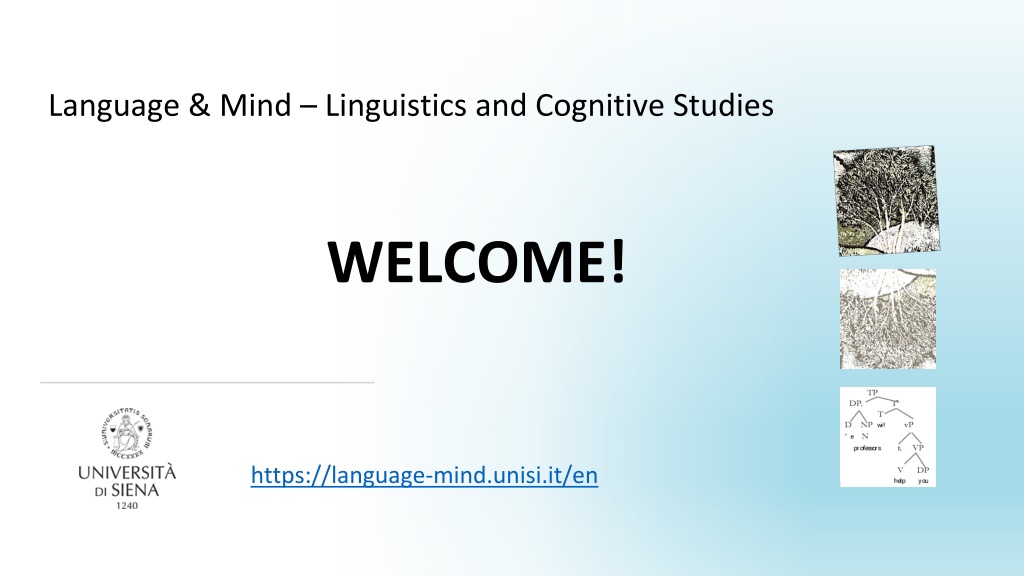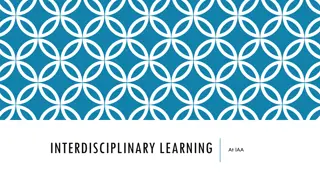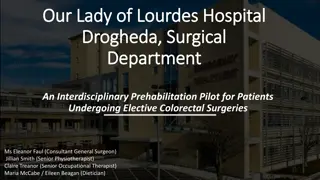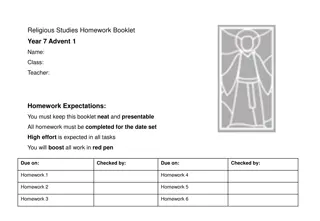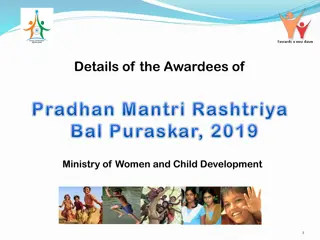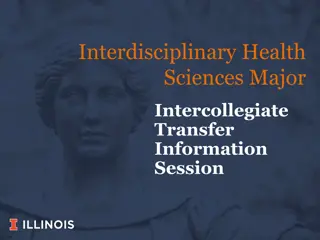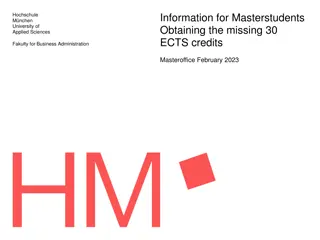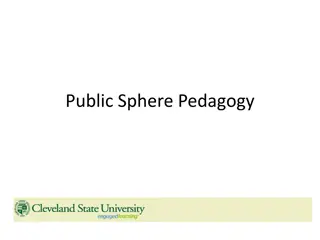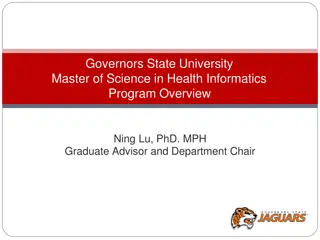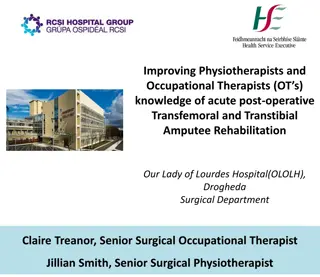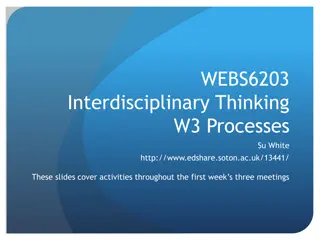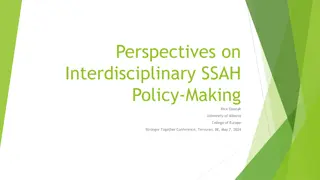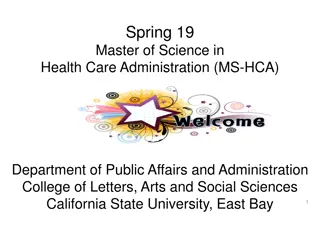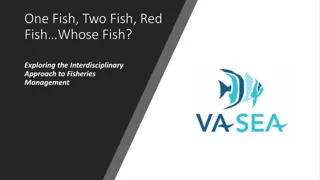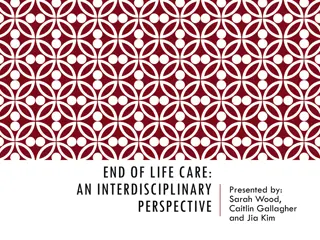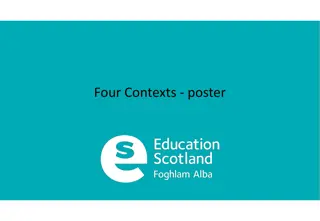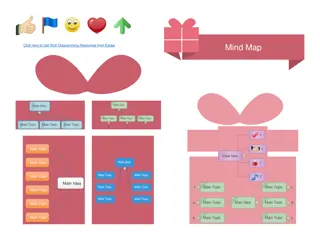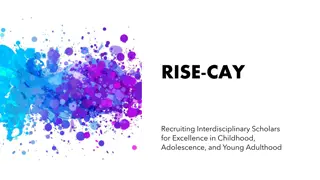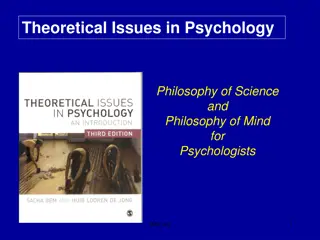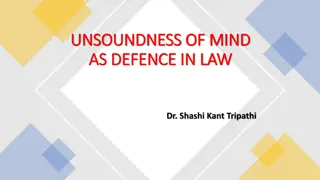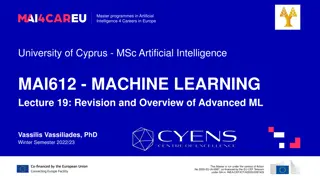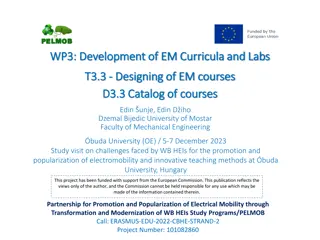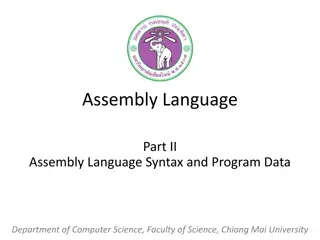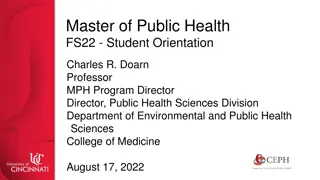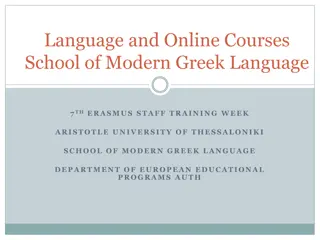Master in Language and Mind: Interdisciplinary MA Program at University of Siena
The Master in Language and Mind is an interdisciplinary program focusing on language as a human cognitive capacity, offering two curricula in Linguistics and Cognition and Philosophy and Cognition, with opportunities for double degree programs and collaborations with international universities.
Download Presentation

Please find below an Image/Link to download the presentation.
The content on the website is provided AS IS for your information and personal use only. It may not be sold, licensed, or shared on other websites without obtaining consent from the author. Download presentation by click this link. If you encounter any issues during the download, it is possible that the publisher has removed the file from their server.
E N D
Presentation Transcript
Language & Mind Linguistics and Cognitive Studies WELCOME! https://language-mind.unisi.it/en
Who are we? The L&M Community The largest international MA program in the University of Siena Students from 20+ countries We meet regularly (3 meetings every year) to discuss what we are doing, and what we are going to do. We engage in active learning in the research seminars and workshops hosted by CISCL: Interuniversity Center for Cognitive Studies on Language (U Siena & U Milan Bicocca) www.ciscl.unisi.it and by our laboratory (referent: prof. Enzo Moscati) Experimental Linguistics and Syntactic Cartography Lab https://www.dispoc.unisi.it/en/research/coworking-lab/ We support individual learning by close contact between students and professors.
Our challenges, and our aims A wide variety of backgrounds: different didactic systems in different countries different BAs (linguistics; philosophy; psychology; speech & hearing) We aim to create a common basis of cross-disciplinary competences in formal linguistics and theoretical philosophy (first year courses) We aim to create individual learning paths in the two curricula, leading to MA thesis projects that are relevant for the research interests and professional objectives of each student (mostly second year): 12 free choice credits 3 credits for guidance and job training -Erasmus exchanges -Double Degree program Universit Paris 1 Panth on-Sorbonne (referent: prof. Salvatore Pistoia Reda)
Overview of the program The Master in Language and Mind is a highly interdisciplinary program aimed at providing a comprehensive understanding of language as a human cognitive capacity, combining theoretical perspectives in linguistics and philosophy with their applications in domains such as computational linguistics, psycholinguistics, text analysis. Special attention is devoted to the domain of language acquisition in diverse modalities and in different populations. The Master offers two curricula: Linguistics and Cognition and Philosophy and Cognition , with flexible options to combine teachings from both. In addition, a Double Degree program is active in collaboration with the Universit Paris 1 Panth on-Sorbonne, as well as several Erasmus agreements with various departments and laboratories across Europe .
Overview of the program o As the title and the description of the MA indicates at the outset, in this program we address the study of language by considering it a fundamental human cognitive capacity. o This is a capacity that all humans have and acquire spontaneously in their childhood, during the first years of life, in the absence of forms of pathology and given an adequate social linguistic environment. Such capacity characterizes the human mind, and thus situates the study of human languages within the domain of cognitive psychology. o A crucial role is given in the program to the descriptive comparative analyses of properties of different languages also through corpus studies, according to explicit formal tools, including syntactic relations, semantic interpretations, phonological analyses. o This is the preliminary basis that enables us to address possible applied domains, from types of language acquisition (first language acquisition, forms of multilingualism), to forms of language pathology, to computational applications using natural languages. o The logical structure manifested by natural languages also has a central role in the overall program for a proper characterization of such human cognitive capacity. o The philosophical and epistemological status of this property of the human mind complete the fundamental ingredients that design the program.
Overview of the program o Graduate students will be able to read research papers and to formulate original research projects; to report their work in seminars and in written essays; to actively participate in discussions in a research team; to design and implement psycholinguistic experiments. i) For graduates from the "Linguistics and Cognition" curriculum, their scientific profile and the professional skills acquired will allow them to apply theories and methods of linguistic research to the description and analysis of natural languages, in the domain of advanced theoretical, experimental and applied research, also from an interdisciplinary perspective; ii) graduates from the "Philosophy and Cognition" curriculum will be able to carry out advanced research at the intersection between cognitive science, philosophy of mind and philosophy of language. o Several students of the MA have continued their academic career in the domains of linguistics and analytical philosophy in the frame of a doctorate. The acceptance rate of our students in doctoral and post-doctoral programs in Italy and abroad has been high over the years: Milano-Bicocca, IUSS-Pavia, Firenze, Trento-Rovereto, Cambridge-UK, Tours, Ghent, Reading, Edinburgh, Frankfurt, Oslo, Paris-ENS, Berlin, Geneva, UCLA, CUNY, etc.
The teaching committee - is composed by four professors and four student representatives organizes and monitors the working of the didactic activities examines students requests about their study plans discusses issues raised by the students through their representatives President, as of now: Valentina Bianchi valentina.bianchi@unisi.it The tutor students have a calendar of meeting hours support students with the bureaucratic procedures and direct them to relevant offices cooperate with the teaching committee in organizing the three meetings and in preparing the newsletter (as of now) Federica Interlandi f.interlandi1@student.unisi.it
The study plan First year 2024-25 (subject to minor changes) Common path Casalicchio Syntactic structures and compositional semantics Module A: Syntactic structures 6 credits + Bianchi Syntactic structures and compositional semantics Module B: compositional semantics 6 credits Bocci Phonetics and phonology 6 credits Moscati Language acquisition 6 credits Cilibrasi Corpora, cognition, and language learning 6 credits Varnier Philosophy of mind I 6 credits + 6 credits Varnier Philosophy of mind II Piccolomini d Aragona Philosophy of logic and philosophy of natural languages Module A: Philosophy of logic 6 credits + Pistoia Reda Philosophy of logic and philosophy of natural languages Module A: Philosophy of natural languages 6 credits
The study plan First year 2024-25 (subject to minor changes) Common path Casalicchio Syntactic structures and compositional semantics Module A: Syntactic structures 6 credits + Bianchi Syntactic structures and compositional semantics Module B: compositional semantics 6 credits Bocci Phonetics and phonology 6 credits Moscati Language acquisition 6 credits Cilibrasi Corpora, cognition, and language learning 6 credits Varnier Philosophy of mind I 6 credits + 6 credits Varnier Philosophy of mind II Piccolomini d Aragona Philosophy of logic and philosophy of natural languages Module A: Philosophy of logic 6 credits + Pistoia Reda Philosophy of logic and philosophy of natural languages Module A: Philosophy of natural languages 6 credits
The study plan First year 2024-25 (subject to minor changes) Common path Casalicchio Syntactic structures and compositional semantics Module A: Syntactic structures 6 credits + Bianchi Syntactic structures and compositional semantics Module B: compositional semantics 6 credits Bocci Phonetics and phonology 6 credits Moscati Language acquisition 6 credits Cilibrasi Corpora, cognition, and language learning 6 credits Varnier Philosophy of mind I 6 credits + 6 credits Varnier Philosophy of mind II Piccolomini d Aragona Philosophy of logic and philosophy of natural languages Module A: Philosophy of logic 6 credits + Pistoia Reda Philosophy of logic and philosophy of natural languages Module A: Philosophy of natural languages 6 credits
The study plan First year 2024-25 One exam (6 credits) to be chosen between: Bianchi: Introduction to formal pragmatics or Casalicchio: Linguistic analyses and multilingualism Keep an eye on the MA webpage where the study plan for 2024-25 will be published: https://language-mind.unisi.it/en/study/study-plan
Second year Linguistics & Cognition (year 2025-26) Belletti Bianchi Bocci Rizzi Zanca Morphosyntax and experimental studies on language Issues in intensional semantics Advanced issues in Phonology and Syntax Theory of grammar Corpora, language and translation 6 credits 6 credits 6 credits 6 credits 6 credits 2 exams chosen among Moscati Guidi Pistoia Reda 6 credits 6 credits 1 exam chosen among Psycholinguistics Methodology of research in cognitive and social psychology Chesi Computational Linguistics 6 credits
Second year Philosophy & Cognition (2025-26) one exam chosen between Advanced topics in philosophy of mind 6 credits Philosophy of cognition 6 credits one exam chosen between Psycholinguistcs 6 credits Methodology of research in cognitive and social psychology 6 credits Pistoia Reda Logic of natural languages 6 credits Bianchi Issues in intensional semantics 6 credits
Second year Common activities Two free choice courses 12 credits chosen by the student from the MA-level courses offered in English at the University: if chosen from within L&M courses, they are automatically accepted if chosen from another program, the choice must be approved by the teaching committee Suitability English C1 (or C2) See the language courses offered at the CLA (https://www.cla.unisi.it/en) NB. Italian language courses can be registered as extra credits 3 credits Job training and guidance 3 credits presentation of personal thesis project + internship organized individually with a L&M professor participation in research seminars and one students thesis presentation session or
The exams Each professor decides on the modality according to their didactic objectives (see the syllabi published on-line): i. Written test ii. Oral (face-to-face) exam iii. Seminar (presentation to the class) or written essay on a selected topic Top grade: 30/30 (cum laude). 18 is the minimum grade to pass the exam.
Extra credits and thesis project In addition to the regular 120 credits, it is possible to take extra exams up to 24 credits. The choice of exams must be approved by the teaching committee. The credits are recorded in the student s diploma supplement (they are not computed in the average for the degree evaluation The thesis project is assigned 18 credits It is supervised by one L&M professor (relatore) Thesis reviewed by one L&M professor and discussed in a public defense (contro-relatore)
The research seminars The Inter-University Center for Cognitive Studies on Language (CISCL) regularly organizes research seminars, both in presence and online, by the researchers of the centre and by guests: www.ciscl.unisi.it/events Online seminars are also offered by the Milan branch of the Center (BIL group). The seminars are announced via the Newsletter, for enrolled students, and on the CISCL website: www.ciscl.unisi.it events
The double degree program UNIVERSIT DI SIENA Language and Mind: Linguistics and Cognitive Studies UNIVERSIT PARIS 1 PANTHEON-SORBONNE - Master Philosophie , parcours Logique et Philosophie des Sciences . Language of teaching: French (minimum level required: B1) In their first-year students in the MA Language and Mind. Linguistics and cognitive studies have the opportunity to participate in the selection for a Double Degree program with the Universit Paris 1 Panth on - Sorbonne. Successful candidates spend their second year at the Universit Paris 1 Panth on - Sorbonne. The thesis is written in French or in English and discussed in both Universities. Participation in the Double Degree favors the gain of further perspectives on topics related to logic, philosophy of science, cognitive and language studies developed in Paris. PROGRAM COORDINATORS University of Siena - Prof. Salvatore Pistoia Reda Universit Paris 1 Panth on-Sorbonne - Prof. Maximilian Kistler
The doctoral program The host Department of the MA (DISPOC) has a doctoral program in Social Sciences and Humanities, with two curricula: Mind and Culture Society and Politics See the description at: https://www.dispoc.unisi.it/en/research/phd/social-sciences-and-humanities General info on doctoral programs at UNISI: https://www.unisi.it/ricerca/dottorati-di-ricerca/informazioni-dottorandi-e-dottori-di-ricerca
Your application The admission committee for international students of the MA program has evaluated the application dossier based on three main criteria: - specificity of the candidate s motivation (see how to write your motivation letter on the MA webpage) - academic excellence - congruence of the academic background to the disciplines of the MA For more information about the MA program write to: valentina.bianchi@unisi.it For assistance with the application procedure, do not write to this email. You can find all the information at: https://admission.unisi.it/ here you also find a form for support requests.
